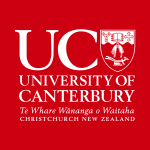Chemistry courses
University of Canterbury

- New Zealand
- World Rank : 301
- Visit Website
A Bachelor of Science (BSc) is about understanding and improving the natural world through observation, experimentation, modelling, and calculation. The Bachelor of Science requires a minimum total of 360 points:
At least 225 points must be from courses above 100-level, with at least 90 points at 300-level.
Double degrees
Many students combine the study of a BSc with another degree.
Conjoint degrees
Students can study the Conjoint Bachelor of Product Design and Science or the Conjoint Bachelor of Commerce and Science, which requires 60 points less than a double degree and will be completed in four years in an intensive format.
Chemistry Major
Chemistry is the central science. It deals with the composition, structure and behaviour of the atoms and molecules that make up all forms of matter. Understanding the world at an atomic level is essential to all areas of science. Chemistry interlinks and contributes to medicine, geology, materials science, molecular physics, biology and astronomy.
Its central role in science is emphasised by the fact that Chemistry merges with Biological Sciences (the field of biochemistry) at one extreme and with Physics (physical chemistry and chemical physics) at the other.
Chemistry propels advances in modern society and has an important role to play in solving major global challenges such as energy sustainability, food supply, health and the environment. Every day we utilise products developed by experimental chemists such as plastics, fabrics, petrol and pharmaceuticals.
Further Study
If you have achieved top grades during your Bachelor of Science, you may be permitted to enter the BSc(Hons), which is an accelerated 12-month postgraduate degree.
Career opportunities
New Zealand's unique mix of primary and secondary industries provides a wide choice of careers in chemistry. Expanding industries in New Zealand, for example those related to new sources of energy and to the development of forestry and dairy resources, are further increasing the demand for qualified chemists.
New Zealand needs chemists in teaching, industry, health and research.
Chemists are well trained in problem-solving and skilled at handling information, which leads naturally into a wide diversity of job opportunities including, for example, sales and management.
Class 12th: 75%
Approved English tests
UC recognises the following English Language tests and courses:
APPROVED ENGLISH TESTS
| University Type | Public University |
| Campus Setting | Urban |
| Establishment Year | 1873 |
| No. of Campuses | 1 main campus |
| No. of Residence Halls | 10 |
| Graduate Job Rate | 89.9% (full time) |
| Research Funding | Above 600,000 NZD pa |
| Cost of Attendance | 29,550 NZD pa |
| Applications Accepted | Online |
| Work-Study | Available |
| Intake Type | Semester wise |
| Mode of Program | Full time and online |
| Courses | UG | PG | Doctorate |
|---|---|---|---|
| Arts | 25,500-30,200 | 29,000-33,800 | 6,749 |
| Business | 28,100 | 29,900 | 7,066 |
| Engineering | 42,000 | 42,000 | 8,130 |
| Science | 32,000 | 34,900-36,600 | 7,062–7,855 |
| Law | 30,200 | 33,800 | 7,066 |
You'll require between $20,000 and $25,000 a year ($380–480 per week) for housing/rent, food, transportation, phone bills, internet usage, and entertainment, in addition to your tuition and insurance fees. The average living expense will be the same for everyone, regardless of their tuition or course price. Please keep in mind that these are only suggestions; the Immigration New Zealand requirement is $15,000 per year including return travel or an additional $2,000.
| General expenses | Cost (in NZ dollars) |
| Rent (per month) | $800–$950 |
| Groceries (per week) | $100–$150 |
| Gym membership (per year) | $300 |
| Entertainment (per week) | $50 |
| Milk (per litre) | $3 |
| Coca Cola (per can) | $2 |
| Cup of Coffee | $3–$5 |
| Lunch from University food hall or campus café | $7–$12 |
| Local calls made from a cell-phone | $0.50–$1.50 |
| Taxi - 5 km ride | $10–$12 |
| Movie ticket | $10–$14 |
| Visit to doctor | $45–$85 |
| Tuition Fees in New Zealand (1st Year Average) | BE/Btech NZD 24605 | MBA NZD 25694| MS NZD 29178 | BSc NZD 30702 | BBA NZD 22863 | MEng NZD 41589 | MIM NZD 34186 | MFin NZD 142025 |
| Average Accomodation & Food Costs in New Zealand | NZD 1250 Per Month |
| Entrance Exams in New Zealand | TOEFL: 74 | IELTS: 6 |PTE: 53 |
| Work and Study in New Zealand | Permitted for 20 hours/week with a valid study permit. |
| Post Study Work Permit in New Zealand | One to Three Years Depending on the Region. |
| Cost of Student Visa in New Zealand | NZD 295 |
| Student Visa in New Zealand | If a student wants to study full time in New Zealand for more than three months, and is willing to pay the full cost of the course, Fee-Paying Student Visa is for him/her. |
| Intakes in New Zealand | There are Two Main Intakes in New Zealand: January Intake and July Intake. |
| Top Job Sectors in New Zealand | Engineering, Software Developing/Programming, Medicine, Education, Accounts, Electrician, Automotive Technician, etc. |
| Economy in New Zealand | Growth Rate of 2.8% (2018), 2.5% (2019e), 2.7% (2020e), 22nd Largest in the World by Nominal |
Tuition & fees :
$ 32,000
Hostel & Meals :
$ 13,040
Total
$ 45,040